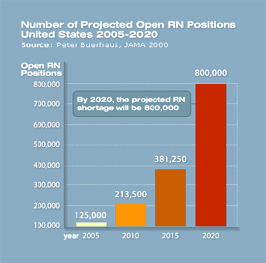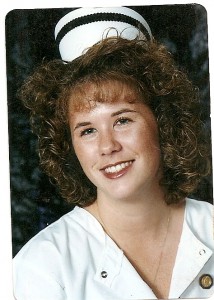Demand for new nurses drops
By Kyle Inskeep
For the first time in years, there’s a surplus of newly-trained nurses who are looking for jobs in Indiana and across the country.
The recent economic downturn drastically reduced the demand for new nurses nationwide.
“There’s a perception out there that nurses will always have a position, and in today’s economy that is somewhat challenged,” said Donna Boland, dean of the Indiana University School of Nursing.
The recession caused baby boomer nurses who were considering retirement to continue working. Other nurses have picked up additional hours to make ends meet in these troubling economic times. Because of this, hospitals are reporting low nursing staff turnover, which means no job vacancies.
Often the only open nursing positions are in specialized units. To work in these units, hospitals typically require a nurse to have five or more years of experience in a hospital setting.
“The shortage areas continue to be critical and emergency care,” said Susan McRoberts, chief nursing officer at St. Vincent Hospital. “Those are tough positions to get into as a new grad.
Recently-licensed nurses like Janette Kollros realize the advantage veteran nurses have.
“If you have experience, you can probably go pretty much anywhere,” Kollros said. “But if you don’t, they don’t want to look at you.”
Kollros has been looking for a full-time nursing position for more than nine months.
“I have applied to numerous hospitals … and I’ve had a total of five interviews,” Kollros said.
She graduated from Anderson University in August 2004 with a bachelor’s degree in nursing. At the time, nurses could go anywhere and find a job, Kollros said. Instead of entering the workforce, she decided to start a family.
Six years later, Kollros returned to the nursing profession and quickly discovered how the 2007 recession directly impacted the healthcare industry.
Healthcare Industry Blindsided by Nursing Surplus
Healthcare professionals say that no one expected that there would be a surplus of registered nurses. Reports from professional nursing organizations predicted the exact opposite.
“I don’t think that any of us could foresee this current nursing surplus,” said Beth Harrison, human resources business consultant at St. Vincent Hospital. “All of the predictions for the last 10 years or so have shown that we would be in a shortage for the next 20-plus years.”
Fifteen percent of the open nursing positions at St. Vincent are entry-level jobs, according to Harrison. Just a year ago, there were more than twice as many open entry-level positions at the hospital.
Recent nursing school graduates like Kollros are surprised by the low number of entry-level nursing positions available.
“I went into nursing school because I like taking care of people,” Kollros said. “But in the back of my mind I knew I could go anywhere and find a job because that’s how it’s always been.”
Kollros now works at St. Vincent Hospital in Indianapolis as a patient care technician. She describes her job as a glorified nursing assistant, a position that helps to pay some of her family’s bills until she can find a full-time nursing job.
Because of her situation, Kollros is deferring repayment of her student loans from nursing school.
“I have a family, a young family, and my husband and I do what we can,” Kollros said. “But it’s frustrating to know that we’re eventually going to have to pay more because of this.”
Faculty Shortage
Another crisis facing the healthcare industry is the shortage of qualified nursing faculty across the country. 
Indiana nursing programs rejected close to 2,500 qualified applicants in 2008 due to a lack of full-time nursing faculty, according to a survey by the Indiana Nursing Workforce Development Coalition.
These numbers are troubling for many healthcare professionals.
“It breaks my heart to have all the applications for nursing school go untended,” St. Vincent’s McRoberts said.
Nursing education isn’t a popular specialty among nurses. Practicing nurses often make more money than nurses who teach at local colleges and universities.
A registered nurse with a bachelor’s degree makes close to $65,000 a year, according to the U.S. Department of Labor. An assistant nursing professor with a master’s degree makes about $50,000 annually, while a professor with a doctoral degree can earn up to $74,000 a year.
“You have to really love teaching students, helping people launch their careers,” said Dr. Anne Thomas, dean of the University of Indianapolis School of Nursing. “Because the pay differential is going to be often times substantial.”
Thomas said that nursing programs across the country are beginning to focus more on pay equity between nurses in hospitals and those who are in the classroom.
She said she hopes that these programs can graduate more students, whom she believes are the key to preventing a possible recurrence of the nursing shortage once the recession ends.
Demand Expected to Return
Registered nurses who are older than 50 will soon be the largest segment of practicing nurses in the healthcare industry, according to the American Association of Colleges of Nursing.
When this group of nurses retires, they are expected to leave a large hole in the nursing workforce.
“We know we have a big glut of nurses nearing retirement age that will be interested in doing that,” McRoberts said. “So there will be jobs available very soon if you can just ride it out.”
The U.S. Department of Health and Human Services estimates that by 2020 hospitals will need 800,000 additional nurses to continue operating effectively.

Despite the trouble some recent graduates are encountering finding nursing jobs, these figures are
the reason Boland still considers nursing to be one of the best career paths.
“If you look at the economics of today projected into tomorrow, we’re seeing that nursing is a good place if one is looking for job stability,” Boland said.
Exactly when the demand for nurses will return is hard to predict, but Kollros said she’ll be ready whenever the time comes.
“(The nursing surplus) will make me appreciate my job lot more than someone who graduated, passed their boards, and got a job,” she said. “I’ve had to work too hard so I will definitely appreciate it a lot more.”
Video: Indiana Nursing Shortage
Click here to see the full interview with Janette Kollros
Interested in learning more about the nursing surplus? Check out these links.
“Forecasts Show Healthcare Reform Will Contribute to Severe Nursing Shortage” http://madduxpress.com/2010/10/19/forecasts-show-healthcare-reform-will-contribute-to-severe-nursing-shortage-12825″Hawaii’s Nursing Surplus”
“Hawaii’s Nursing Shortage Turns to Nursing Shortage” http://www.hawaiinewsnow.com/Global/story.asp?S=13615287
Nursing 2000 Website http://nursing2000inc.org/
Share this story on 

Filed Under: News



